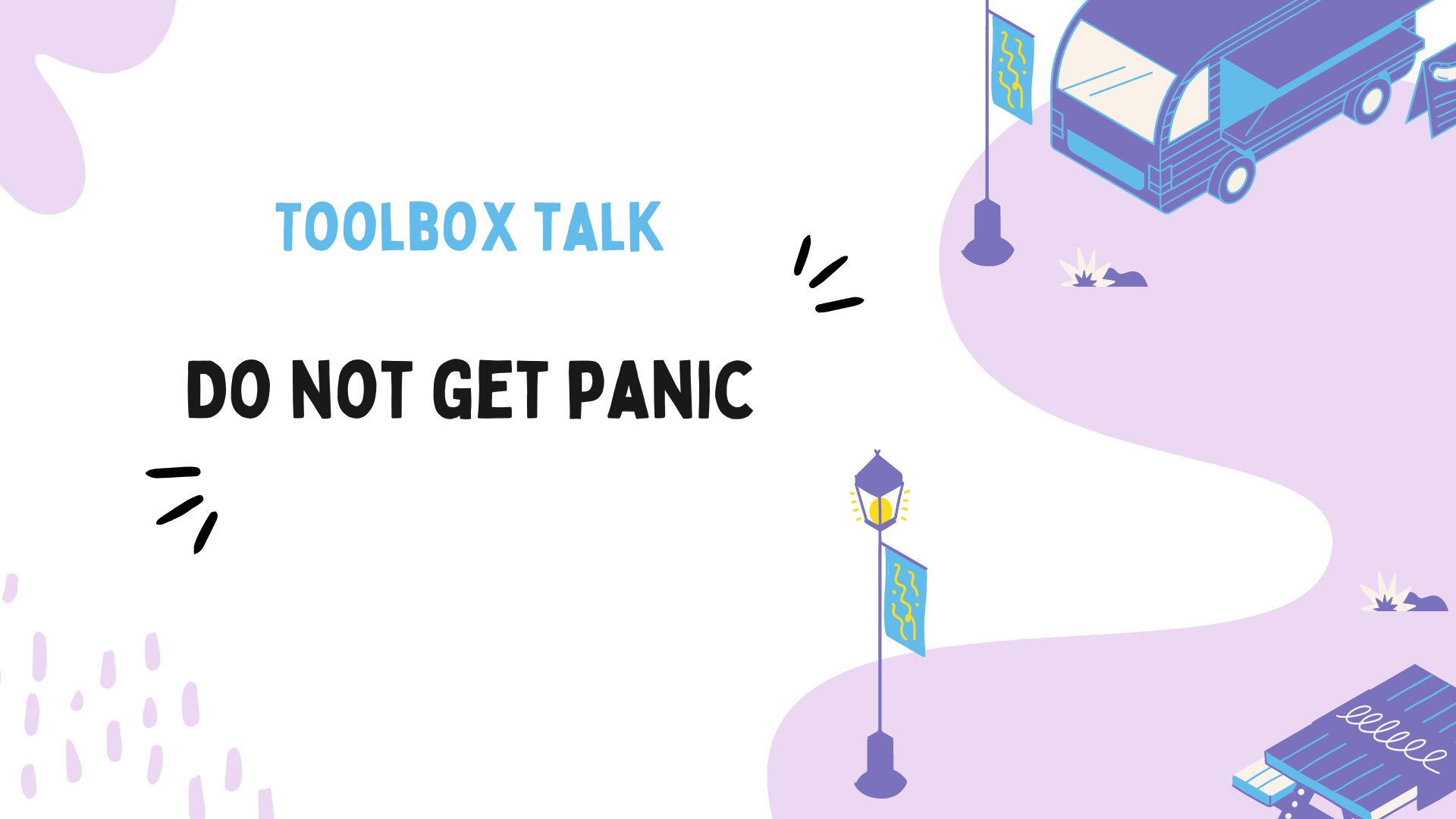Do not get panic is today's toolbox topic. The sight of a traffic accident has a dampening effect on the driver who views the scene. The same driver who ten minutes before was driving the vehicle at maximum speed, most likely ten minutes after passing the scene of the accident has slowed down and with both hands on the steering wheel continues his course with great safety awareness.
Do not get panic
There is a mass psychological reaction to almost all
accidents. It has good and bad features. Psychological reactions to accidents
or violent incidents are very varied. Some of these reactions are emotional
shock, disbelief, hysteria, and panic. Panic is the
worst since it is a violent reaction without reason.
Panic can have disastrous consequences. We have an
illustration of what we say in the tragedy that occurred during a soccer game in which hundreds of people perished according to news of the rumor
of a bomb in the studio. The terrified crowd rushed to the exit doors and in a horrible
stampede to escape they ran over each other, dying tangled under the weight of
thousands of people or suffocated from lack of oxygen.
Wherever people congregate to work, play, shop, study, etc. panic is brewing. It is always present in the plant, and the workshops, waiting for a critical moment to incite disaster. Panic takes many forms, not always, necessarily, people run away terrified. So, train people for emergency situations and advise them "Do not get panic during an emergency inside plant".
Let's see what can happen in an industrial plant. Suppose the plant uses chemicals in its manufacturing process. It is early in the morning and the first shift of the working day. Suddenly an explosion occurs in a remote section of the reformer area.
The shock wave affects the main
production area. The floor seems to rumble violently, and all along one side of
the building window panes shatter into the street. A kind of harmless
atmospheric mist spreads inside the place.
Immediately after the explosion a deathly silence descends on the place that lasts almost twenty seconds. Then the murmur of the hundreds of workers begins and each time the voices are louder. In the middle of this, someone starts coughing.
From somewhere comes a voice that shouts "Gas!" In less than twenty seconds the screams begin the panic. In reality, no one has suffered even a scratch as a result of the explosion. There has been no damage except to the window panes, but the fear of the unknown has led to panic among the workers.
Two supervisors who are in the production areas as soon as
they hear the explosion immediately know its origin and what it means. It is
simply the bursting of the steam collector of the boiler. However, these two
supervisors do nothing to calm the fears of the workers who are around them and
one of them begins to smile.
Two hours later the plant manager is talking to reporters. He shakes his head with a sad expression on his face as he looks towards the freight gate where six dead bodies are found. I don't understand how this happened! There was no reason for everyone to panic and rush out of the premises. No damage, just noise. Do not get panic during an emergency.
Whose fault is it? It
was terrible to see them screaming, one on top of the other trying to reach the
exit. They believed there was gas in the place. The fault is nobody's.
Related toolbox
Do not get panic during an emergency
I agree, it is essential to stay calm during an emergency.
Panicking can make the situation worse and make it more difficult to think
clearly. Here are some tips on how to remain calm during an emergency:
- Take deep breaths. This is one of the most important things you can do to calm down. Breathe in slowly and deeply through your nose, and breathe out slowly through your mouth.
- Focus on the present moment. Don't think about what might happen, or what has already happened. Focus on the here and now, and on what you need to do to stay safe.
- Help others if you can. This can help you to feel more in control of the situation, and it can also help to distract you from your fears.
- Trust the emergency response team. If there are emergency personnel on the scene, follow their instructions. They are trained to deal with these situations, and they will know what to do to keep you safe.
- Contact the emergency contact number and report.
- Calmly go to the assembly point.
.jpg) |
Conclusion
It is also important to remember that it is normal to feel
scared during an emergency. Everyone reacts to stressful situations differently.
If you find yourself panicking, don't be afraid to ask for help. Some people can help you to stay calm and to get through the situation. Always follow the safety rules.
Here are some additional tips on how to stay calm during an
emergency:
- Have a plan: If you know what to do in an emergency, you'll be less likely to panic. Make a plan for what you'll do in the event of a fire, a tornado, or other disaster.
- Stay informed: Listen to the radio or TV for updates on the emergency. This will help you to know what is happening and what you need to do to stay safe.
- Stay connected: If you're separated from your family or friends, let them know that you're safe. This will help to reduce their anxiety and fear.
Remember, it is important to stay calm during an emergency.
Panicking will only make the situation worse. Remember, you're not alone. Panic
attacks are common, and there are things you can do to manage them.
.jpg) |
Do not get panic


